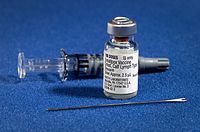
Photo from wikipedia
Insufficient pancreatic β-cell mass or function is one of the main causes underlying diabetes mellitus. Glycogen synthase kinase 3 (GSK3) is a ubiquitously expressed serine/threonine kinase. GSK3 is encoded by… Click to show full abstract
Insufficient pancreatic β-cell mass or function is one of the main causes underlying diabetes mellitus. Glycogen synthase kinase 3 (GSK3) is a ubiquitously expressed serine/threonine kinase. GSK3 is encoded by two known genes, GSK3 alpha (GSK3A) and GSK3 beta (GSK3B), and small molecule inhibitors targeting both are known to induce micronucleation. Isoform specific small molecule inhibitors targeting GSK3B have demonstrated increased cell proliferation and expansion of islets mass in human and rodents. However, many of the inhibitors target dual specificity tyrosine-phosphorylation-regulated kinase 1A (DYRK1A) in addition to GSK3B making the data difficult to interpret (Shen et al, Nature comms 2015). Mice with β-cell overexpression of GSK3B have reduced β-cell mass and proliferation through modulation of PDX-1 stability. Recently, Ammala et al. demonstrated conjugation of ASOs to glucagon-like-peptide-1 receptor (GLP-1R) ligand can productively deliver ASO cargo to the insulin secreting β-cells. The doses needed for GLP-1-conjugated ASOs to silence target genes in the β-cells are below what is needed to affect target gene expression elsewhere allowing for evaluation of specific inhibition in the β-cells. In lean C57B6 mice a single administration of GLP-1-conjugated GSK3B ASO achieved an ED50=0.016µmol/kg with no change to DYRK1A RNA expression. Here we demonstrate robust, specific GSK3B reduction in the β-cells after GLP-1-conjugated GSK3B ASO treatment in db/db mice. In contrast to the SMI data, specific inhibition of GSK3B in β-cells worsened the health based on reductions in β-cell specific genes, PDX1 and MAFA, and decreased the β-cell mass (2.9 ± 1.3mg GLP-1-Con ASO vs. 1.4 ± 0.6mg GLP-1-GSK3B ASO). In addition, no effect on glucose or insulin was observed suggesting specific inhibition of GSK3B in the β-cell is not enough to preserve the function and increase β-cell survival. In summary, we have invalidated GSK3B as a therapeutic target for protecting the β-cell against glucotoxicity and T2D. Disclosure S. Murray: Employee; Self; Ionis Pharmaceuticals. J. Zhang: None. A. Ferng: None. T. Prakash: None. R. Lee: Employee; Self; Ionis Pharmaceuticals, Inc. E. Andersson: Employee; Self; AstraZeneca. Stock/Shareholder; Self; AstraZeneca. D. Janzen: None. L. Knerr: None. C. Ammala: None. S. Guo: Employee; Self; Ionis Pharmaceuticals, Inc.
Journal Title: Diabetes
Year Published: 2020
Link to full text (if available)
Share on Social Media: Sign Up to like & get
recommendations!